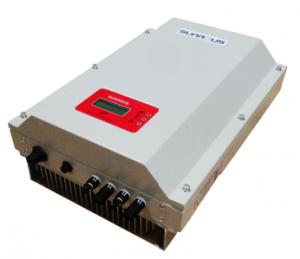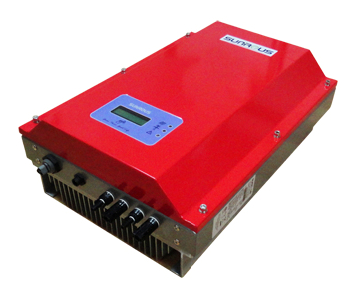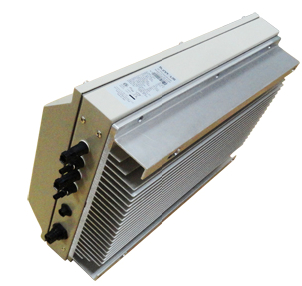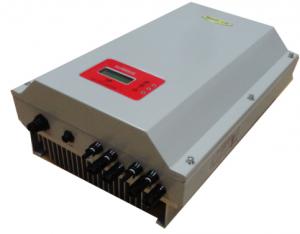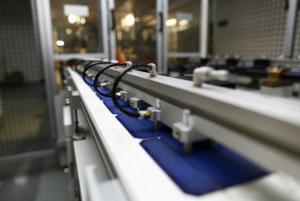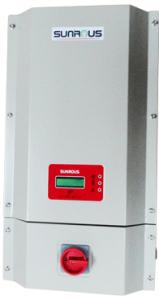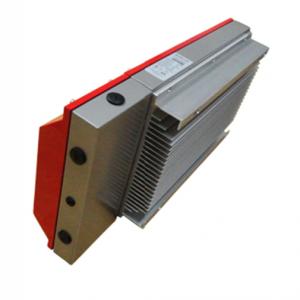Residential Solar Inverter with PV Grid-Tied Inverter Dual MPPT and Solar Panels
- Loading Port:
- Shanghai
- Payment Terms:
- TT or LC
- Min Order Qty:
- 10 mm
- Supply Capability:
- 1000 mm/month
OKorder Service Pledge
OKorder Financial Service
You Might Also Like
PV Grid-Tied Inverter Dual MPPT and Solar Panels
Datasheet:
GT4.0-ZX-01/HF | |
Input(DC) | |
Max.DC Power | 4000W |
Max.DC Voltage | 500V |
PV Voltage range, MPPT | 60V ~ 360V |
Max.input current | 30.0A |
Number of MPP trackers | 2 |
Max.number of strings (parallel) | 4 |
Output(AC) | |
Nominal AC power / | 4000W/4000W |
Max.output current | 16.0A |
Nominal AC Voltage / range | 180V~264V |
AC grid frequency / range | 47.5-51.5Hz / 59.3-60.5Hz |
Power factor at rated power | 1 |
THD | < 3% |
AC connection | Single-phase |
Efficiency | |
Max. efficiency/Californian efficiency | > 98.0% / > 97.0% |
MPP adaptation efficiency | > 99.0% |
Protection devices | |
DC reverse polarity protection | √ |
AC short-circuit protection | √ |
Ground fault monitoring | √ |
Grid monitoring | √ |
Output Transient Voltage Suppression | √ |
Over load | √ |
Anti-islanding | √ |
General data | |
Dimensions (W/ H / D) in mm | 370 / 540 / 185 mm |
Weight | 23kg |
Operating temperature range | -25 ~ +60℃ |
Storage temperature range | -40 ~ +70℃ |
Ambient humidity | 0 ~ 100% |
Consumption (night) | < 0.5W |
Topology | HF-transformer galvanic isolation |
Cooling concept | Convection |
Enclosure type | IP65 / NEMA 3R |
Features | |
DC connection: PV special connector | √ |
AC connection: connector | √ |
LCD display & Backlit | √ |
LED display | √ |
Interfaces: RS485 | √ |
Warranty: 10 years | √ |
Certificates & approvals | G83 / G59 / TUV / SAA / ETL / JET/ CE |
·High frequency transformer isolation and conversion efficiency rate up to 97%.
·Dual input sections with independent MPP tracking, allows optimal energy harvesting from two sub-arrays oriented in different directions
· High speed and precise MPPT algorithm for real time power tracking and improved energy harvesting, as well as regular MPP Adaptation Efficiency of over 99.0%.
·Flat efficiency curves ensure high efficiency at all output levels ensuring consistent and stable performance across the entire input voltage and output power range
·Wide input DC MPPT range(150V~550V)/output AC voltage range (180V~264V)
·IP 65/NEMA 3R, outdoor enclosure for unrestricted use under any environmental conditions
·Any modules can be used and fit in this device whether crystalline or thin-film.
·Use in residential applications requiring PV array plug-in grounding.
·RS-485 communication interface (designed for connection to computer or data-logger)
·Easy to install and operate with reduced weight.
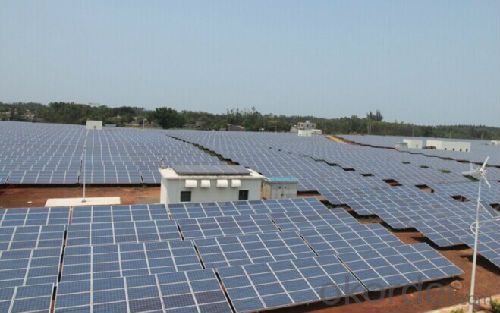
- Q: Are there any noise emissions from a solar inverter?
- Yes, solar inverters do produce some noise emissions. However, the noise levels are generally very low and often not noticeable, as the inverters are designed to operate quietly.
- Q: Photovoltaic grid-connected inverter without DC emc how will happen
- by means of energy converters can be converted into electrical energy. The process of converting light energy directly into electrical energy is precisely the response to photovoltaic effects. Without the need for any other mechanical parts, the energy in
- Q: What is the role of a power quality analyzer in a solar inverter?
- The role of a power quality analyzer in a solar inverter is to monitor and analyze the quality of the electrical power being generated by the solar panels. It measures various parameters such as voltage, current, frequency, harmonics, and power factor to ensure that the power being generated is within acceptable limits and meets the required standards. By detecting any deviations or abnormalities in the power quality, the analyzer helps in identifying and rectifying issues that could affect the performance and efficiency of the solar inverter and the overall solar power system.
- Q: Can a solar inverter be used in areas with high altitude and low temperature conditions?
- Yes, a solar inverter can be used in areas with high altitude and low temperature conditions. However, it is important to choose a solar inverter specifically designed for such conditions, as extreme cold temperatures and high altitudes can affect the performance and efficiency of standard inverters. Specialized inverters that can withstand low temperatures and operate at high altitudes are available in the market to ensure optimal functioning of solar power systems in such environments.
- Q: Can a solar inverter be used with a solar-powered water pump?
- Yes, a solar inverter can be used with a solar-powered water pump. The solar inverter converts the DC power generated by the solar panels into AC power, which is suitable for powering the water pump. This allows for efficient and reliable operation of the pump using solar energy.
- Q: Can a solar inverter be used with a wireless communication system?
- Yes, a solar inverter can be used with a wireless communication system. In fact, many modern solar inverters are designed with built-in wireless communication capabilities to allow for monitoring and control of the system remotely. This enables users to access real-time data, adjust settings, and receive notifications about the performance of their solar power system through a wireless connection, such as Wi-Fi or cellular networks.
- Q: How does the quality of the AC waveform affect the performance of a solar inverter?
- The quality of the AC waveform directly impacts the performance of a solar inverter. A poor quality waveform can introduce harmonics and distortions, leading to reduced efficiency, increased heat generation, and decreased overall performance of the inverter. It can also cause issues with the functioning of other electrical equipment connected to the inverter. Therefore, ensuring a high-quality and clean AC waveform is crucial for optimal performance and longevity of a solar inverter.
- Q: Can a solar inverter be used with a solar-powered data center?
- Yes, a solar inverter can be used with a solar-powered data center. A solar inverter is an essential component that converts the direct current (DC) generated by solar panels into usable alternating current (AC) electricity for powering electrical devices and systems, including data centers. By using a solar inverter, a solar-powered data center can efficiently utilize the renewable energy generated by solar panels to meet its power requirements.
- Q: Can a solar inverter be used in areas with high electromagnetic radiation?
- Yes, a solar inverter can be used in areas with high electromagnetic radiation. However, it is important to consider the specific requirements and limitations of the inverter as some models may have different tolerance levels for electromagnetic interference. It is recommended to consult the manufacturer's specifications or seek professional advice to ensure proper functioning and safety in such environments.
- Q: What is the role of a remote monitoring system in a solar inverter?
- The role of a remote monitoring system in a solar inverter is to provide real-time data and analysis of the solar inverter's performance and energy generation. It allows for remote access and control, enabling the monitoring and management of the solar system from a central location. This includes monitoring the system's output, identifying and diagnosing any issues or faults, optimizing energy production, and ensuring overall system efficiency and reliability.
Send your message to us
Residential Solar Inverter with PV Grid-Tied Inverter Dual MPPT and Solar Panels
- Loading Port:
- Shanghai
- Payment Terms:
- TT or LC
- Min Order Qty:
- 10 mm
- Supply Capability:
- 1000 mm/month
OKorder Service Pledge
OKorder Financial Service
Similar products
Hot products
Hot Searches
Related keywords
